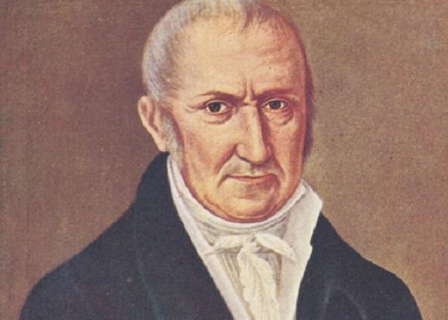
WTI Magazine #85 2016 November 21
Author : Giovanni Verde Translation by:
The inventions and discoveries of Alessandro Volta have provided this Italian scientist fame and an immense popularity. Indeed, the invention of a device that would generate electricity without the help of an external power supply, aka the battery, represented a turning point in the evolution of technologies and scientific progress in the history of humanity. Even the discovery of methane gas, occurred by chance, gains in this times a more symbolic value for the West.
Alessandro Volta was born in Como (Lombardy) on February 18, 1745. His extraordinary scientific vocation, evident from the earliest years of his life, soon causes his parents to abandon any ambition for him of priesthood or lawyer. In 1775 Alessandro finalizes the perpetual electrophorus, an electrostatic generator that can accumulate a modest amount of electric charge in a discontinuous manner. The invention arouses amazement and admiration in the scientific world.
In 1778 in the letter on the ability of the electrical conductors, Volta introduces - next to the concept of "power capacity" - the fundamental concept of "voltage", now replaced by the term "potential difference", beginning to draw a conceptual different path, that is getting him close to the great idea of the battery.
In 1795 Volta publishes important results in the study of the behavior of the saturated vapor, very timely topic raised by the construction of steam engines then used in industry. At the end of 1799 Alessandro Volta comes to what he will define "the great passage": the invention of the battery, which takes place in his home in Lazzate, In a communication dated March 20, 1800 and addressed to the President of the Royal Society, Sir Joseph Banks, Volta announces to the scientific community the invention of the battery, or "electric apparatus" or "column apparatus," which he called "artificial electric organ."
The so-called "voltaic battery", a predecessor of the electric battery, would have produced a constant electric current. Initially Volta conducts experiments with individual cells connected in series. Each cell is essentially a wine goblet filled with brine, where two dissimilar electrodes are immersed. In the electric battery, the goblets are replaced by cardboard soaked in brine.
Through various experiments, Volta finds that the most effective pair of dissimilar metals producing electricity would be made of zinc and copper. The phenomenon underlying the functioning of the voltaic battery, whereby between two metallic conductors different places in contact is established a small potential difference, will take the name of Volta effect.
In the fall of 1776, Alessandro Volta studies a phenomenon known from the most distant times: in a stagnant bend in the river Lambro, approaching a flame to the surface would flare up bluish flames. Volta decides to study deeper this matter. While he is a guest in his friend Teresa Castiglioni's house in Angera, the scientist discovers the inflammable air in the Isolino Partegora swamp, near Varese. Trying to shake up the bottom with the help of a stick, Volta watches the rise of bubble gases to the surface, and collects them in a bottle. He then gives this gas the name of "air flammable swamp" and discovers the opportunity to inflame it, whether through a lighted candle, or by an electrical discharge: Volta comprises that the gas is formed from the decomposition of animal and vegetable substances. It is the discovery of methane.
In September of 1801, Volta has the honor of presenting his invention to the then First Consul of France, Napoleon Bonaparte. At the height of enthusiasm and admiration, Napoleon offers that the Academy would honor him with the gold medal (later awarded in the December 2nd session), the appointing as a foreign member of the "Institut de France" and assigns him a donation and an annuity.
On March 5 of 1827 Alessandro Volta dies at his home in Camnago, now Camnago Volta in his honor, at the age of 82 years.



